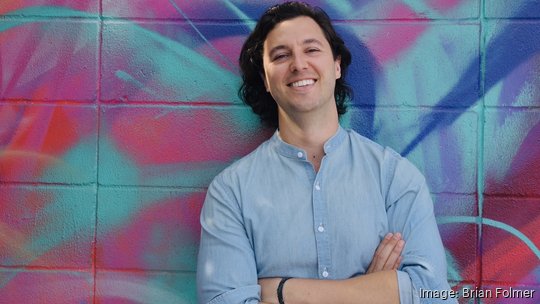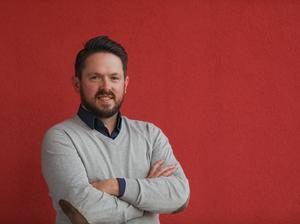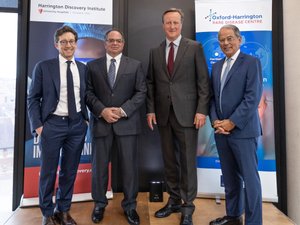
Brian Folmer, the founder of FirstLook and FirstLook Ventures, is launching his first startup since returning to Cleveland from a stint in New York City.
Folmer grew up in the Cleveland area, where he caught the startup bug and launched his first business. In 2014, he went to work in New York City, where he launched FirstLook, which puts branded products worthy of investment into a box and sends the boxes to a network of venture capitalists. It's Folmer's way of connecting brands to the venture capital they need.
Now, Folmer is back in Cleveland and preparing to buy a house, raise a family and launch his latest business, Distrobox, which borrows from FirstLook's brands-in-a-box approach to get branded products in front of busy distributors who could take the products and their companies to the next level of sales.
Although FirstLook is dual-based in New York City and Cleveland, Folmer is all about his hometown. He cares most about increasing venture capital access for Cleveland brands and growing the city's startup resources to reduce brain drain and attract outside talent. He also wants to inspire the next generation of Cleveland startup founders to think as big as those who founded the city in 1796.
The Cleveland Business Journal caught up with Folmer — who with his wife, Michele, is an apartment dweller in Cleveland's Ohio City neighborhood — to discuss his entrepreneurial journey and why he came back to Cleveland. This interview has been edited for clarity and brevity.
Tell me about your first business.
Between my first and second year of law school, I was working at a Cleveland accelerator called Bizdom, which was part of Dan Gilbert's Rock family of companies. I fell in love with being in that office surrounded by founders, investors and really bright people.
I submitted a business idea for BackerBar.com and became a member of Bizdom's fall 2012 cohort. Have you ever run into a Cleveland Browns bar in Chicago or San Diego while traveling? The Browns have one of the largest backer-bar networks in the world, but it was a really fragmented world. So we created a platform that helped traveling or relocated sports fans find their bar in whatever city they were in. It was going well, but we didn't have enough traction to raise our next round of funding, so I had to shut it down and move on.
What came next?
I jumped into corporate retail at Abercrombie & Fitch's home office near Columbus. After a year, I transferred to Victoria's Secret International in New York City. I was still obsessed with the startup world, so I ended up applying to a startup accelerator that focused on retail, tech, consumer goods and marketplaces.
I noticed that consumer brands kept sending boxes of samples to the accelerator as if the accelerator could invest in them. I thought there should be a box that curates the best brands each month and turns that one-to-one grind of trying to find an investor into a one-to-many investors situation. That's how I came up with FirstLook. I am not wealthy enough to be an investor, so I and some of my friends put a few grand into a special-purpose vehicle to invest in brands. That's what I call FirstLook Ventures.
FirstLook launched two days before New York City locked down because of Covid — which ended up being a blessing in disguise. All those networking events where founders and investors bumped into each other came to a screeching halt. So FirstLook became an important connector between founders and investors.
What have you been doing since returning to Cleveland?
I'm launching Distrobox, which is a separate entity that works with FirstLook to solve the second-biggest pain point for consumer brands — sales. Through Distrobox, we send boxes of brands to independent distributors. A lot of the distributors are mom-and-pop shops that spend little time onboarding new brands. Distrobox solves this problem by getting a brand's products into the hands of distributors.
Why did you come back to Cleveland?
I could not be more happy about moving back to Cleveland and being closer to family and friends. There are still some issues here, and not everyone's rowing in the same direction, but compared to 2012 when I left, the city feels like it's driving forward.
Also, once I got a taste of working in the startup community here, I needed to come back to Cleveland to support the city that made me. I'm making some sacrifices. There aren't as many investors here. There's not as strong of a concentration of consumer brands here. But this is home.
What are you working on next?
A friend and I are thinking about putting together a venture capital fund for local investors and investors who have ties to Cleveland but live somewhere else. We're going to call it the 1796 Fund, which is the year Cleveland was founded, to enable investors who live abroad to invest in Cleveland brands. The investing thesis is simple: Cleveland people are psycho about Cleveland. There's such a great story here of bringing Cleveland back to its roots and making it a prominent destination again.








